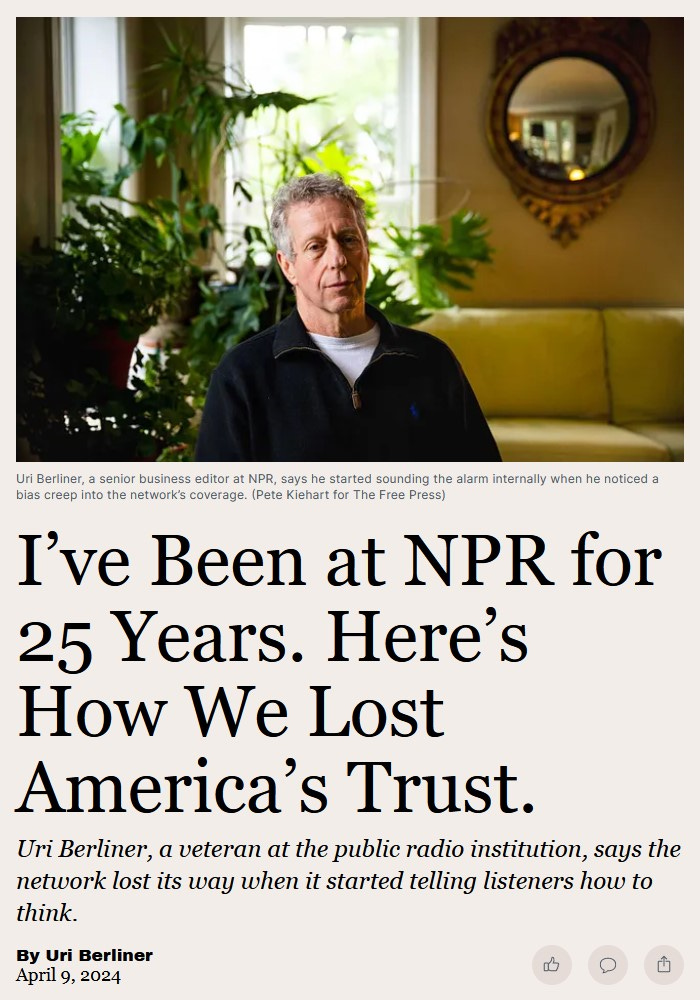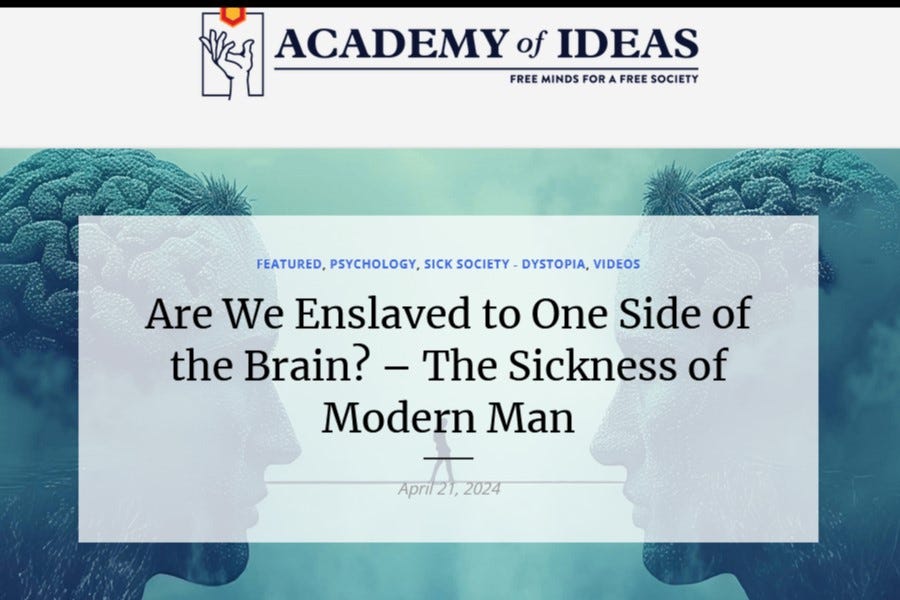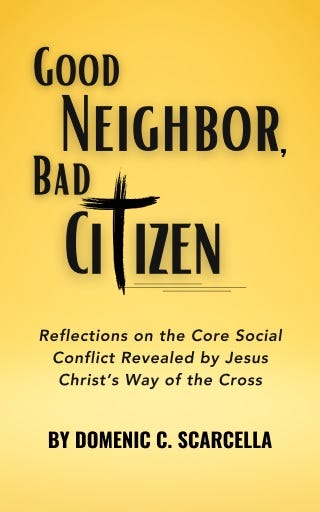C.S. Lewis, NPR, Wikipedia, Left-Brain Pathology & Stockholm Syndrome
A Busy Journey Through ‘Moral Busybodies’ & the Evil of ‘For Your Own Good’
An exchange on Twitter/X with the fine gents at “The History Homos Podcast” — hear my episode with them at Spotify, Rokfin, Odysee, Bitchute, and read about it in my March 20 Substack post — about the lingering #COVIDHoax nanny state prompted me to recall this C.S. Lewis quote:
“Of all tyrannies, a tyranny sincerely exercised for the good of its victims may be the most oppressive. It would be better to live under robber barons than under omnipotent moral busybodies. The robber baron's cruelty may sometimes sleep, his cupidity may at some point be satiated; but those who torment us for our own good will torment us without end for they do so with the approval of their own conscience.”

Lewis’ insight pertains to so much of the modern politicized world and its “for your own good” intrusions against peaceful people. And it reminded me of the ongoing story of NPR’s internal turmoil, as expressed publicly by now-former Senior Business Editor Uri Berliner. He’s since resigned after being suspended because he, in NPR’s own words, “failed to secure its approval for outside work for other news outlets, as is required of NPR journalists.”
Do whistleblowers typically ask permission from their employer before whistleblowing?

Berliner’s actions brought scrutiny to NPR and new CEO Katherine Maher, whose professional history includes lots of moral busybodiness: Council on Foreign Relations … UNICEF … National Democratic Institute … World Bank … Access Now … the Atlantic Council … U.S. Department of State’s Foreign Affairs Policy Board.
She was CEO and executive director of Wikipedia’s parent organization, Wikimedia Foundation, and gave a TEDTalk in 2021 in which she claimed Wikipedia shifted its focus from “one key truth to instead finding minimum viable truth.”
Do a search on Twitter/X for Maher, and you’ll find plenty of recently resurfaced clips of interviews in which she considers the First Amendment and “free and open” internet to be obstacles to her pursuit of her preferred version of truth.
She seems typical of NPR and many other mainstream/legacy media outlets that tend to be fanatically pro-government (even if they don’t like some of the government’s officials).
Berliner was right to raise a ruckus.
Where does this human pathology come from?
In the midst of collecting my thoughts on the moral-busybody events, I saw this Academy of Ideas video report (with a written version) on our bipartite — having two asymmetric hemispheres, right and left — brains.
The report, “Are We Enslaved to One Side of the Brain? – The Sickness of Modern Man,” follows the work of psychiatrist and neuroscience researcher Iain McGilchrist on the different strengths of left-brain processes and right-brain processes.
What stood out most to me was the finding that left-brain dominance tends toward narrower attention and an emphasis on strict rule following.
The longstanding fostering of imbalanced, overwhelmingly left-brain public culture points to exactly the kind of “moral busybodying” that Lewis warned about; that Berliner implicitly called out in his warnings about biased news; that Maher, a very pro-government careerist, celebrated.
But why do many-to-most people go along with such pathological influences? The very next day, I stumbled upon another video from evolutionary biologists Heather Heying and Bret Weinstein, with this nugget on the problem of compliance and, in extreme cases, Stockholm Syndrome:
All else being equal, smarter always beats dumber. But all else is not always equal, because to the extent that somebody else is in control of the well-being that flows to you or the harm that flows to you, they can exactly reverse those parameters.
When compliance and outsourcing our thinking/beliefs/ethics seem to offer us more safety, we can fall into this animal-survival mode and even defend those who actually endanger us.
But succeeding as a mere animal could mean that you’ve failed as a human being.
Or, as I’ve been writing regularly in both book form and in these weekly Substack reports, being such a good citizen inevitably conflicts with the Christian call of good neighborliness and the anarchist/voluntarist mode of nonviolent, consent-based interactions.
The irony, of course, is that there’s nothing morally good about the moral busybodies’ intrusive, violent behavior. Coercive civil authority is inherently, intrinsically evil (#CCAIIIE).
And as Lewis noted, there seems to be little-to-no chance of satiating the moral busybodies.
Genuine Christians and anarchists/voluntarists from any tradition will simply have to undermine them as best we can, continuing to be good neighbors and bad citizens.
The Comments welcome responses from either or both halves of your brain …
If you’re familiar with the bipartite brain (or watched/read the Academy of Ideas essay to learn about it), do you consider yourself more left-brained or right-brained or an even mix? Has your tendency changed over time? Do you keep a decent balance, despite your tendency toward one half?
What do you think of “moral busybodies” in high-status positions within the imposed, hierarchical social order? Of government-crony/connected media outlets (like NPR) and politicized sources (like Wikipedia)? Of coping mechanisms (like Stockholm Syndrome)?
Anything else stand out to you about the issues in this week’s post?
Let me know your impressions in the Comments …






This is such an encouraging and illuminating post. Very meaty. The Academy embedded video is also inspiring.
When I was a young child growing up in post-WWII Washington, D.C., I experienced a brain injury that not only caused an out-of-body experience for me, but which also led to medically-related medical trauma of electrodes glued to my head and all kinds of other nutty stuff. I now believe the accident caused some sort of disruption in my left brain operations. Having come from a family of scientists, engineers and successful businessmen, this has been a stumbling block for me. But I believe the injury may also have led to a high focus on the arts and an abiding interest in what we may call “higher consciousness.”
This trait has actually proved to be helpful (or at least interesting) for me in our current chaotic times! Thanks to the additional layer of reality introduced by the internet, we can now read of credible scientists and philosophers considering alternate realms of reality, as well as formerly schizophrenic-sounding topics such as the possible existence of “aliens”—which some contemporary brilliant minds are even suggesting might be the angels and demons referred to in this ancient book I learned about….
In older age, I now regard my life as a fascinating road of self-discovery, a little science mixed with much spiritual exploration.
In recent years, there is much deja-vu in our society and I know I’m not alone. My University of Maryland experience of the 60s and 70s included tear gas and tanks. Highway patrolmen and human blockades in the streets. There was burning of buildings in the name of peace, cutting off access to classrooms in the name of education….why is the present so eerily familiar?
How can Huxley’s test tube babies, produced at an imaginary facility called The Hatchery, be actual reality in 2024? How is it that we’re holding out our hands and wallets en masse, like robots, for our dose of Soma? How long has Big Brother been watching us? What should we be calling him instead of “brother?”
As a young adult, I related most to the crazies among us: Back-to-the-earth hippies. Turn In, Tune In, Drop Out. Be Here Now.
Huxley, Orwell. Bradbury. Truth-seeking. Solitude in nature blended with community. Hunting and growing your own healthy food. Herbal tea. Homesteading. Children. Love. Books. So many books.
And music. Always the music.
Yes, Joni, they did, indeed, pave paradise and put up a parking lot.
We were outliers, the self-described “freaks.” But now I see this craziness coming to a fascinating fruition. More and more of us yearn to join The Book People as the present world increasingly resembles Idiocracy.
My husband was a Navy veteran from Vietnam era. We know how those guys got treated (hint: “Babykillers!!”). So when we married we took the John Prine route:
"Blow up your TV
Throw away your paper
Go to the country
Build you a home
Plant a little garden
Eat a lot of peaches
Try an' find Jesus on your own.”
Easy? Nope. But worked out well for us in the end.
Let me sum up this rant by saying that by the grace of a loving God, who gave His only (I suspect you know the rest), I’m experiencing these last miles of my own journey with a sense of affirmation, despite the angst of my Boom generation. It’s been a journey of finding the Creator of all this magnificence in order to overcome the evil that seeks to separate us from our Creator and each other.
“We are stardust, we are golden/ We are caught in the devil's bargain/And we've got to get ourselves/Back to the garden.” (Crosby, Stills, Nash & Young)
Your post blessed me today. Thank you for sharing it and for permitting me to indulge in a little morning writing exercise.